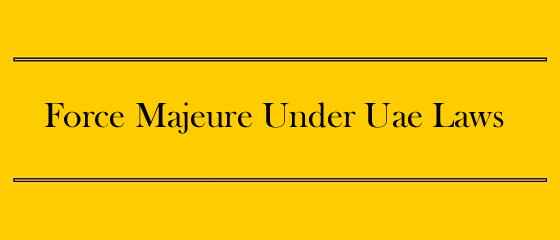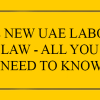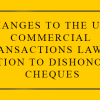Introduction
Force Majeure Under UAE Laws – COVID-19 has made governments and other public bodies impose excessive restrictions and movement suspension. This has caused a downturn in business operations and subsequently increased the weight on contractual obligations and the likelihood of failure to perform these obligations. A force majeure clause provides an excuse for non-performance of a contractual obligation by any party in exceptional and unforeseeable circumstances. Force Majeure is an event beyond the scope and control of all contracting parties. This article clarifies the application and legality of force majeure in UAE laws. This article covers the functioning of the force majeure clause in different jurisdictions within the UAE. This article examines the legal implications and effect of the force majeure clause in the contracts. Due to the lack of a universal approach, the parties to the contract are advised to pay proper attention to contract terms and conditions and approach a UAE Lawyer for specific advice on the matter.
Force Majeure in the UAE
The United Arab Emirates (UAE) follows the civil legal system. However, Dubai International Financial Centre and Abu Dhabi Global Market specifically follow the common law system. The perspectives of both systems prevailing in the UAE will be discussed further in this article. UAE laws do not specifically and comprehensively describe “Force Majeure” however, include provisions addressing the concept of force majeure and its consequences. UAE Courts have also provided reliable guidance by interpreting such provisions. If the contract is silent on the force majeure clause, the contracting parties would still be able to depend on the legal provisions. De jure applies even if the clause is not explicitly mentioned in a contract. The UAE Civil Code (Federal Law No. 8 of 1985) provides various provisions on force majeure and its consequences. The law clarifies the differentiation of force majeure from those events rendering the performance of the contract burdensome.
The UAE Civil Code deals with the doctrine of force majeure. Article 273 provides that if a contract is deemed impossible to perform due to a result of force majeure then the contract will be terminated automatically. As a result, the corresponding obligations shall stand cancelled. Further, only the impossible part will be extinguished/void in case of partial or temporary impossibility of performance of a contract. The Civil Code permits the party enforcing force majeure to cancel the contract provided that the other party has been made aware of the same. The Abu Dhabi Court of Cassation (No.13/2010) held that obligations becoming burdensome is not the ground to evoke force majeure, there must be an external event that makes the obligations completely impossible to perform by the parties..
Whether there is any alternative relief to projects impacted by COVID-19 under UAE laws?
The total and partial absolution from contractual obligations is permitted by the UAE Civil Code depending on the facts and circumstances of the case. Article 249 of the UAE Civil Code empowers a judge and an arbitrator to amend and improve the contractual obligations to a “reasonable level” as per exceptional circumstances of the case. However, Article 249 of the UAE Civil Transactions Law also provides that under unpredictable circumstances, where the performing the contractual obligations has burdened the debtor by incurring heavy losses or economic impact, the judge on merit by exercising the discretion reduces debtor’s burdens to reasonable limits in the interest of justice, keeping in view the interest of both parties. Any agreement by the parties to the contrary will be held void according to Article 249. Lastly, the important aspect that has to be seen is that the circumstance under Article 249 must be exceptional. For arriving at any conclusion it is very important to check the contractual provisions properly with the help of UAE Lawyer.
Article 287 of the UAE Civil Code provides that a person shall not be bound to make the loss good where there is no legal provision or agreement to the contrary if he proves that the loss occurred out of irrelevant cause such as unavoidable accident, force majeure, natural disaster, the act of the person suffering loss or act of a third party where he played no part. Article 893 and 894 of the UAE Civil Code specifically governs muqawala contracts, contracts to perform a task or to make a thing, they include construction contracts as well. Either party has a right to terminate the contract, if “any cause” prevents performance of the contract or completion of the same. The contractor will be entitled to the value of work completed and the incurred expenses if a contractor furnishes that he is incapable to satisfy a muqawala contract on basis of unforeseeable cause (in which they played no part). The contractor’s entitlement shall match the total value that its counterparty derived from the incomplete performance. Article 894 provides a right of compensation to the contractor who becomes incapable of completing works for a reason it played no part in.
The Dubai International Financial Centre (DIFC) Laws
The DIFC Contract Law (DIFC Law No. 6/2004) governs contracts within the free zone’s jurisdiction and provides the provisions governing situations where due to certain circumstances the performance of obligations may not be possible. Specifically, Article 82(1) of the DIFC Law No. 6/2004 provides that if the party proves that non-performance of contractual obligation arose due to uncontrollable or exceptional circumstances then in such case the party may be excused for non-performance of contractual obligation. Article 82(2) states that the obligations may be held off in the case of a temporary issue until it will be reasonable to continue further. It can be interpreted that the specific impediment identified and framed by a party will be placed on better footing. For example, if a party can highlight, justify the duration, and explain the specific “lockdown” measure that impeded the performance of the contractual obligation it is more likely to have the comforting ear of the other party and the court or tribunal.
The party who is unable to fulfil or complete their contractual obligation must furnish a notice of ability to perform obligation to the other party as per Article 82(3). The notice should comply with notice provisions in contract as well as advised to specify
- the impediment
- the duration and continuation of impediment
- reason for non-performance as a consequence of the impediment
Further Article 82(4) provides that a party shall be entitled to terminate a contract on basis of the occurrence force majeure event. The performing party has to notify the creditor in respect of the force majeure event. The creditor is entitled to damages if the performing party fails to notify. Article 82(4) enables parties to either withhold performance or terminate the contract altogether, or request interest on money due (if any).
It is to be noted that force majeure events do not affect the obligation of paying debts.
In the following cases party may be excused from performance of obligations if:
- the event causes non-performance;
- the event was beyond the control of party
- the party could not reasonably have assumed the risk (while entering into the contract); and
- the party could not have reasonably avoided or overcome the event or its consequences.
Force majeure in Abu Dhabi Global Market (ADGM) law
The English common law is followed by the Abu Dhabi Global Market (ADGM) free zone. The party must prove the scope of the force majeure clause and its application to the facts. The English common law requires a party to prove a force majeure clause as under DIFC law and also considering the specific wording of the clause. A party must establish the above mentioned points in the article. The parties must rely on the English law doctrine of frustration in the omission of a force majeure clause to relieve from the repercussion of their non-performance. The contract may be frustrated where an extrinsic factor outside the control of parties renders the performance of obligations the contract different from what was initially agreed. Without retrospective effect, the contract is treated as terminated.
Force Majeure clauses in relation to Covid-19
Force Majeure clause in the contract has great significance in the Covid-19 and lockdown. It covers events like natural calamities, war, sanctions of government and sets forth the consequential terms during the event of force majeure when the performance of contractual obligations becomes strenuous or impossible. It is not necessary that a normal force majeure clause will shield the obligator’s interest and all events which cause impediment on the performance of obligations. A deficient clause creates a fragile shield for the obligor and secures the creditor’s position to some extent. Whereas, force majeure clause submitting to prevailing laws or omission of such a clause gives the option to the parties for determining the effect of the contract in accordance with the prevailing laws. For effective application and enforcement of force majeure clause, it is important to draft with a wide possible angle which includes specific words like “pandemic”, “hazardous items”, “government restrictions” and covers “lockdown” etc. the contracting parties shall not consider and apply force majeure clause which makes it troublesome of any contracted party.
Article 246 of the Civil Transactions lays down general guidelines for parties to implement a contract in good faith. It says:
- The contract shall be implemented according to its provisions
- The contract shall be implemented in a manner consistent with the preconditions of good faith
- The contract is not restricted to what is contained therein
- The contract shall be in accordance with the custom, laws and the nature of the transaction
Reliance has to be placed on Article 390 of the Civil Transactions Law as follows:
- The contracting parties may fix the amount of damages in advance either in the contract or in a subsequent agreement
- The judge may, in all cases, amend such an agreement at the request of one of the parties for making the amount assessed equal to the prejudice. Any agreement contrary to the above shall be declared void.
A common law perspective of frustration with respect to force majeure clause
The force majeure defence is not absolute. For example, Mr. A and Mr. B enter into a contract. There are circumstances where the performance of a contractual obligation might not get frustrated fully, and Mr. A and Mr. B still have the chance to perform the obligation after some time i.e., the frustration event is temporary and after the same is over. In this case, it will not be a valid defence as the risk involved is foreseeable in nature.
Conclusion
From the above analysis and discussion, we can see that UAE courts have given guidance on the provisions governing the force majeure clause from time to time. The UAE courts have examined and interpreted the force majeure clauses based on the facts and circumstances of the case. The court has to examine unforeseeable and unavoidable events. The court will further check if the event was totally out of control of a non-performing party and the party must not have assumed the risk for that event under the contractual terms. The same approach will be applicable for parties who raise specific events of Covid-19 pandemic as force majeure. Every case will be judged on its facts and circumstances. The contracting parties should perform their obligations in good faith but it’s nowhere expressly mentioned that the party has a duty to mitigate the losses. It is necessary for the parties to communicate their respective positions for determining and agreeing to those terms which are for the best interests of parties. The parties must comply with the laws of UAE for the best interest and they must take care that notice is served to the other party timely specifying the explanations and reasons for non-performance of contractual obligation to prevent their own losses.
It should always be kept in mind that reliance on force majeure clauses and actions related to it will depend on the facts, circumstances and terms of contract between parties. In response to it parties can take note of the following points while considering force majeure clause in Covid-19:-
- Parties should consider if the event was within the contemplation of the parties when the contract was formed.
- They should ask the appropriate and accurate cause of the inability to perform the contractual obligations.
- Ask about the obligation(s) which cannot be performed. If there are multiple causes, they should also consider the same.
- Parties should examine and research about what are the available alternative ways through which obligation(s) can be fulfilled.
- What steps can be taken to alleviate the effects of the force majeure event.
- Parties should give notice with the relevant contractual provisions accordingly.






